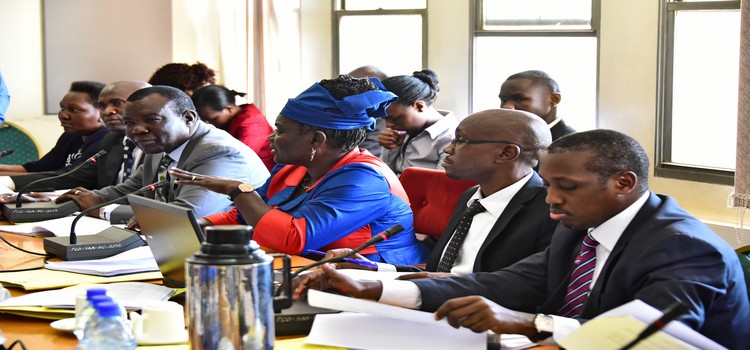
Public Accounts Committee During A Probe Of Police Accounting Officers
Members of Parliament have queried inconsistencies by the Ministry of Gender while paying out compensation to public servants injured in line of duty.
The MPs on the Committee on Public Accounts (Central Government) were meeting the Permanent Secretary of the Ministry, Pius Bigirimana, while considering the Auditor General’s Report for the financial year 2016/2017.
The meeting, held on Tuesday 23 October 2018, was chaired by Committee Vice Chair, Hon. Gerald Karuhanga (Ind., Ntungamo Munic.)
The Auditor General’s Report indicated arrears amounting to Ushs4 billion in payments to public servants injured in the line of duty.
Karuhanga, however, raised concern over unpaid compensation to former public servants, whose requests were filed many years ago.
“I see claims of 1993, 1997 and 2003 which have not been paid, yet I see people of 2008 and after who have been paid. What is the criteria of payment?” he asked.
PS Bigirimana said that the arrears are as a result of non-budgeted for claims filed by government workers.
“We budget for a certain amount but the claims exceed our budget and we cannot stop people from getting injured on job, nor can we stop them from complaining,” Bigirimana said.
He said that the Ministry mostly responds to claims on a ‘first come, first served’ basis, although they this can be waived for special cases.
“There are situations that are a matter of life and death which will necessitate us to payout; otherwise we operate on those who come first,” he said Bigirimana.
However, Hon. Matthias Mpuuga (DP, Masaka Munic.) said that Bigirimana was reporting contrary to what was indicated in the Auditor General’s Report.
Mpuuga also asked the PS to provide the Committee with a statement showing the process of verifying and payment of a claim.
He said that there have been reports of claimants of the workman’s compensation being unfairly treated with others being favoured.
“We need to know who determines the extent of danger of someone’s injury so that their claim is settled immediately; we want to know how you arrive at that,” said Mpuuga adding that, “We want to make sure that you follow a proper due-process when you are compensating these people.”




























